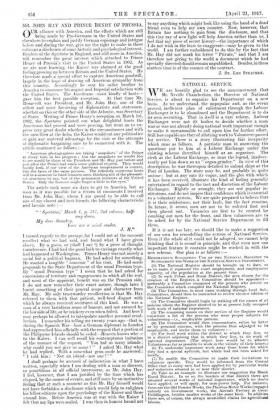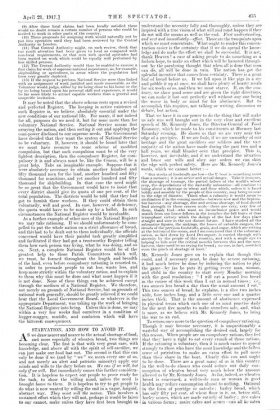. NATIONAL SERVICE.
WE are heartily glad to see the announcement that Mr. Neville Chamberlain, the Director of National Service, is about to organize his Department on a new basis. As we understand, the unpopular and, as the event proved, inefficient plan of enlistment through the Labour Exchanges is to be abandoned and the Department is to do its own recruiting. That in itself is a vast reform. Labour Exchanges were not fit bodies to decide whether a man was or was not already doing national work important enough to make it unreasonable to call upon him for further effort.
Still less capable are they of allotting work to Volunteers passed for service. There is a story illustrating this incapacity which runs as follows. A patriotic man in answering the questions put to him at a Labour Exchange under the existing scheme described himself as an organizer. The clerk at the Labour Exchange, so runs the legend, inadver- tently put him down as an " organ-grinder." In view of this description, he was thereupon detailed to unload ships at the Port of London. The story may be, and probably is, quite untrue ; but at any rate its vogue, and the glee with which it has been received, illustrate the kind of feeling generally entertained in regard to the tact and discretion of the Labour Exchanges. Rightly or wrongly, they are not popular in- stitutions, and do not inspire that confidence which is essential to a voluntary system. We are quite prepared to believe that it is their misfortune, not their fault, but the fact remains. In future, it seems, men are not to be enlisted first and then placed out. Vacancies are first to be created by combing out men for the front, and then volunteers are to be asked for by the National Service Department to fill them.
If it is not too late, we should like to make a suggestion of our own for remodelling the system of National Service. Even if the whole of it could not be adopted, we cannot help thinking that it is sound in principle, and that even now one important feature it contains might be worked in with the new scheme. Our plan is as follows :— MEMORANDUM SUGGESTING USE OF THE NATIONAL REGISTER TO SUPPLEMENT THE WORK OF THE NATIONAL SERVICE DEPARTMENT.
(1) The National Register should be brought up to date, so as to make it represent the exact employment, and employment capacity, of the population at the present time. (2) In each Urban and Rural District, the area chosen for the creation of the Register, a Committee should be appointed— preferably a Committee composed of the persons who served on the Committee which compiled the National Register. (3) This Committee, in most cases working through local Sub- Committees, should then be instructed to review the new edition of the National Register. (4) The Committee should begin by striking off the names of all persons whom the Register showed to be at present fully occupied with work of national importance. (5) The remaining names on their section of the Register would constitute a list of the persons who were proper subjects for volunteering—i.e., employable persons. (6) The Committee would then communicate, either by letter or by personal canvass, with the persons thus adjudged to be employable, and invite them to volunteer :- (a) For local work within the district in which they live, or in a district adjoining that in which they live, to do work of national importance. (The object hero would be to allocate Volunteers as far as possible to work in the vicinity of their homes.) (b) To undertake important work away from home for which they had a special aptitude, but which had not been asked for locally.
(7) To enable the Committee to make their invitations to volunteer specific. They would be informed from the Central Office that so many men had been applied for by particular works and industries situated in or near their district.
(8) Take as an example to illustrate our suggestion the Blank Rural District. In or on the borders of that district there are situated several works of national importance, which no doubt have applied, or will apply, for man-power help. For instance. there are the Old Powder Works, the Phoebus Motor Works (engaged entirely on Government work), the Aircraft Factory at Great Peddlington, besides smaller works of the same kind. In addition there are, of course, the always unsatisfied claims for agricultural labour.
(9) After these local claims had been locally satisfied there would no doubt remain a certain number of persons who could be invited to work in other parts of the country. (10) These proposals for assigning work would naturally not be put into operation until they had been reviewed by the Central Authority in London. (11) That Central Authority might, on such review, think that too much attention had been given to local as compared with non-local requirements, or that men with special aptitudes had been wasted on work which could be equally well performed by less skilled persons.
(12) The Central Authority would thus be enabled to exercise a first claim for work of supreme national importance, as, for example, shipbuilding or agriculture, in areas where the population had been very greatly depleted.
(13) If the request to perform National Service were thus linked with an assignment of work justified and made reasonable, as the Volunteer would judge, either by its being close to his home or else by its being based upon his personal skill and experience, it would be far more likely to attract capable workers than a general and unspecific invitation.
It may be noted that the above scheme rests upon a revised and perfected Register. The keeping in active existence of such Register is, we believe, absolutely essential under the new conditions of our national life. For many, if not indeed for all, purposes do we need it, but for none more than for voluntary National Service. National Service means first arraying the nation, and then sorting it out and applying the man-power disclosed to our supreme needs. The Government have decided that they want the system of National Service to be voluntary. If, however, it should be found later that we must have recourse to some scheme of modified compulsion, but that such compulsion must be of the very lightest description, then the compulsory Register, for com- pulsory it is and always must be, like the Census, will be a great help. Take an imaginable example. Suppose that it were absolutely necessary to obtain another hundred and fifty thousand men for the land, another hundred and fifty thousand for munitions, and yet another hundred and fifty thousand for shipbuilding. In that case the need might be so great that the Government would have to insist that every district should give its quota of one per cent. of the total population. The districts would be told that they had got to furnish these workers. If they could obtain them voluntarily, well and good. In case, however, of deficiency, the quota would have to be made up by a ballot; In such circumstances the National Register would be invaluable. As a further example of other uses of the National Register we may take rationing. If we should unfortunately be com- pelled to put the whole nation on a strict allowance of bread, and this had to be dealt out to them individually, the officials concerned would have their painful task greatly simplified and facilitated if they had got a trustworthy Register telling them how each person was living, what he was doing, and so on. Next, a complete National Register would be of the greatest help to those Parish Committees which will, we trust, be formed throughout the length and breadth of the land, even before compulsory rationing is resorted to, in order to persuade people to eat less, waste less, and keep more strictly within the voluntary ration, and to explain to them why this must be done and what must happen if it is not done. None of these things can be achieved except through the medium of a National Register. We therefore, not merely on grounds of National Service, but on grounds of national work generally, should be greatly relieved if we could hear that the Local Government Board, or whatever is the appropriate Department, was taking up the work of bringing the National Register into being. Unless this is done, we may within a very few weeks find ourselves in a condition of hugger-mugger, muddle, and confusion which will have the bitterest consequences.



























 Previous page
Previous page